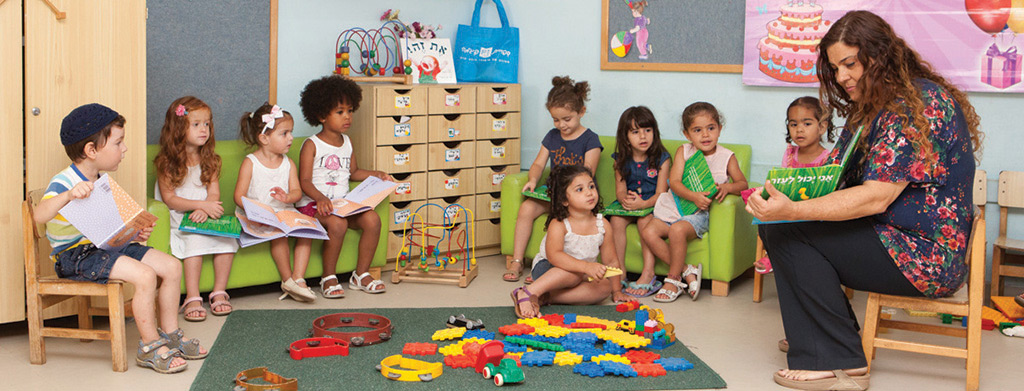Same Programs, Different Countries: The Heart of PJ Library in Israel

As PJ Library expanded into new regions around the world, it made perfect sense that the Jewish children’s book program would spearhead similar initiatives in the heart of the Jewish world — Israel.
The Harold Grinspoon Foundation took its first step in Israel by launching Sifriyat Pijama, which is Hebrew for “Pajama Library.” After growing in the Hebrew-speaking community for several years, the Foundation expanded into the Arab community by launching Maktabat al-Fanoos, or “Lantern Library” in English. Implemented by Keren Grinspoon Israel, these two sister programs of PJ Library offer equal opportunities for growth and development for all children in the State of Israel.
We spoke to Inbal Tofach, director of Sifriyat Pijama, and Asma Zahalka, director of Maktabat al-Fanoos, to get a sense of how the Israel-based programs differ from the original PJ Library in Western Massachusetts and how they are still, at the core, the same.
Home vs. School
The first and most obvious difference between PJ Library and both Sifriyat Pijama and Maktabat al-Fanoos? The books don't arrive in home mailboxes. In both Israeli programs, books are given to students at school, and children get to enjoy them in class before taking them home. “In contrast to PJ Library, our first natural connection is with teachers and not parents, which is a big difference,” says Tofach. This model benefits from educators first bringing the books to life in the classroom and undertaking activities to enhance the book experience. Then children take the books home for continued engagement and to add them to their personal libraries. Tofach points out that “in addition to the suggested activities and conversation starters that appear in all of the books, we reach out to parents through an array of digital outlets, such as Facebook, WhatsApp, and Pinterest.” The vast majority of Jewish families in the US and Canada already have some picture books in their homes. In Israel? “For about 40% of Jewish children, the only picture books at home are Sifriyat Pijama books,” explains Tofach. “This is another indicator of our books' importance.”
Similar Yet Different Goals
The goal of the books is different too. PJ Library is specifically a Jewish literacy program; the books impart Jewish values, life events, and narratives. While Sifriyat Pijama also features books and support materials about Jewish and Israeli identity and culture, because the program is school-based, it has also developed into a literacy program.
Another interesting difference between PJ Library and Sifriyat Pijama is the nuance of the books. Many PJ Library books would be considered culturally inappropriate for the Israeli market; some might even be considered too religiously oriented. Because Sifriyat Pijama books are distributed to children across the entire spectrum of Israeli society, the goal is to find books that can act as a common denominator for more and less religious families. This is especially important because most families do not sign up to receive the books.
Because the Arab community in Israel is home to different religions, Maktabat al-Fanoos does not touch upon religious values or traditions. Instead it aims to encourage discussions about Arab culture, humanistic values, children's experiences, and social-emotional learning while also fostering a younger generation with an enhanced appreciation for the Arabic language.
A Huge Contribution
For the past 8 years, Maktabat al-Fanoos has been providing books to every child in 3,600 schools and preschools annually. “For a significant majority of the Arab population, the only picture books they have in their homes are Fanoos books,” explains Zahalka. “When these children finish second grade, they have received 32 Fanoos books — a huge contribution.” Fanoos has become a critical resource for advancing full command of the Arabic language and the joy of reading. Like Sifriyat Pijama, Fanoos provides an educational continuum from the classroom to the home, providing young children the opportunity to read the books multiple times and do several activities.
Zahalka points out that Maktabat al-Fanoos books have another goal. “Our quality books help children understand themselves and their emotions. They're about self-esteem, being connected to feelings, and educating toward social and universal values.”
Annually, Keren Grinspoon Israel provides around 570,000 children with quality books in more than 14,000 institutions. Since Keren Grinspoon Israel's inception, it has distributed a whopping 30 million books to Israel's children!
Both Tofach and Zahalka understand the importance of children's books: They are mothers themselves, and their children receive Keren Grinspoon Israel books. While Sifriyat Pijama and Maktabat al-Fanoos are fundamentally literacy programs, both point to an underlying shared goal with PJ Library. “We try to create intimacy between parent and child,” Tofach says. “We are giving them an opportunity for dialogue. Parents can share memories of holidays, family, and values.”
Zahalka heartily agrees. “I want everyone to know that a book can be a treasure. It’s a huge opportunity for parents to learn more about their children, to learn about what they are feeling and experiencing,” she says. “This is the gift that we give: to discover your children and to let your children discover you.”